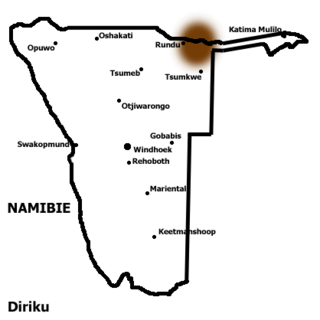Gciriku, or Dciriku (Also Diriku, Dirico, Manyo or Rumanyo), is a Bantu language spoken by 305,000 people along the Kavango River in Namibia, Botswana and Angola. 24,000 people speak Gciriku in Angola, according to Ethnologue.[3] It was first known in the west via the Vagciriku, who had migrated from the main Vamanyo area and spoke Rugciriku, a dialect of Rumanyo. The name Gciriku (Dciriku, Diriku) remains common in the literature, but within Namibia the name Rumanyo has been revived.[4] The Mbogedu dialect is extinct; Maho (2009) lists it as a distinct language, and notes that the names 'Manyo' and 'Rumanyo' are inappropriate for it.
| Dciriku | |
|---|---|
| Gciriku | |
| Rumanyo | |
| Region | Kavango East |
| Ethnicity | Vagciriku, Vamanyo, Vashambyu |
Native speakers | 82,000 (2004–2018)[1] |
| Dialects |
|
| Language codes | |
| ISO 639-3 | diu |
| Glottolog | diri1252 |
K.331,334 (K.332)[2] | |
 | |
It is one of several Bantu languages of the Okavango which have click consonants, as in [ǀɛ́ǀˀà] ('bed'), IPA: [mùǀûkò] ('flower'), and IPA: [kàǀûrù] ('tortoise'). These clicks, of which there are half a dozen (c, gc, ch, and prenasalized nc and nch), are generally all pronounced with a dental articulation, but there is broad variation between speakers. They are especially common in place names and in words for features of the landscape, reflecting their sources in Khwe and Ju, two so-called Khoisan languages. Many of the words with clicks in Gciriku, including those in native Bantu vocabulary, are shared with Kwangali, Mbukushu, and Fwe.[5]
Phonology
editVowels
edit| Front | Central | Back | |
|---|---|---|---|
| Close | i | u | |
| Mid | ɛ | ɔ | |
| Open | ɑ |
Consonants
edit- Click sounds are mainly dental [ǀ], but may also have various articulation points [ǁ], [ǃ].
- Most consonant sounds are also palatalized [ʲ] or labialized [ʷ], when before glide sounds /j, w/.
- /ɡ/ may be heard as a fricative [χ] in Afrikaans loanwords.[6]
References
edit- ^ Dciriku at Ethnologue (25th ed., 2022)
- ^ Jouni Filip Maho, 2009. New Updated Guthrie List Online
- ^ "Angola". Ethnologue. Retrieved 2019-07-19.
- ^ Nordic journal of African studies, Volume 12, 2003
- ^ Gunnink, Hilde; Sands, Bonny; Pakendorf, Brigitte; Bostoen, Koen (1 December 2015). "Prehistoric language contact in the Kavango-Zambezi transfrontier area: Khoisan influence on southwestern Bantu languages". Journal of African Languages and Linguistics. 36 (2): 193–232. doi:10.1515/jall-2015-0009. hdl:1854/LU-7005944.
- ^ Möhlig, Wilhelm Johann Georg (2005). A Grammatical Sketch of Rugciriku (Rumanyo). Cologne: Rüdiger Köppe Verlag.